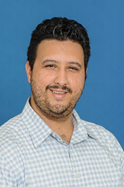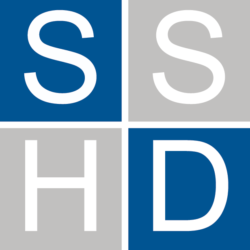Taking closer look at research and experiences of SSHD members
This month we are getting better acquainted with the research of Alan Meca, an Assistant Professor in the Department of Psychology at Old Dominion University.

1. What drew you to do work in human development?
As the child of immigrant parents, education has always been emphasized as a doorway by which I can succeed. Indeed, as is often the case, having had limited opportunities, my parents emphasized the importance of education resulting in constant pressure to succeed. This is probably the reason why growing up, I have always had an interest in trying to answer the big questions (e.g., Who are we? Why are we here?).
Although engineering and physics were my original focus, as I excelled in my high school studies, I noticed some others did not. During my introduction to psychology, I began asking the question “why?” regarding the individual differences behind motivation, personality, and drive. Subsequently, I knew I wanted to play a role in helping youth succeed and thrive. At Florida International University, this focus was solidified into an interest focused on human development. I then became involved with Dr. William Kurtines at the Miami Youth Development Project (YDP), an outreach research-based intervention that aims at empowering adolescents in voluntary alternative high schools, where these interests were furthered.
Under Dr. Kurtines’ mentorship, I learned about relational metatheory, developmental systems, and positive youth development. As one who portrays development as complicated, contextualized, and multifaceted, I became more and more enthralled with the underlying conceptualization of humanity. My parents had limited opportunities to engage in their own identity process, what Marcia (1966) would refer to as foreclosed, and my brother struggled with figuring out his identity. This led to my own fascination with the topic of identity.
2. Did you have any mentor or a researcher who had substantial influence in your path or work? Is there a significant moment or story that capsulizes the nature of that influence on your scholarship or professional journey?
I have been fortunate, in my career, to have had a number of important mentors who have played a substantial role in my life. Mrs. Dianne Holmes, my High School psychology teacher was one of the first teachers that not only recognized my potential but allowed me to be myself and introduced me to a whole new field of science. Dr. Kyle Eichas, then a doctoral student gave me the opportunity to work in the Miami YDP and was my direct supervisor under Dr. Kurtines. Dr. Eichas not only exposed me to developmental science and identity theory but he spent a substantive amount of time mentoring me in statistics and how to work with AMOS and Mplus. Concurrently, as I noted previously, Dr. Kurtines played a central role in introducing me to developmental science; first as my instructor in Theories of Personality and Psychology of Adolescence, and then as my research mentor, modeling what an academic should look like. Dr. Dionne P. Stephens also served as an important role model by being a constant advocate for me, and also by exposing me to methodological and theoretical orientations that expanded my early training. She also modelled success as a person of color (POC) in academia. Finally, I do not think I would be where I am today if not for the generosity of Dr. Seth J. Schwartz who gave me opportunities to work and publish utilizing his various datasets, and also greatly facilitated the development of my statistical, methodological, and professional development.
3. You have a range of important work, select 1-2 findings that you feel are key contributions to human development and describe those in brief. What might be the cultural, inclusion or global significance of your work?
Although my research has focused on identity development across various domains, the majority of my research has focused cultural identity, acculturation, and sociocultural stressors that contribute to mental health among Latinx populations, and more broadly, among ethnic/racial minorities. Exemplifying this work, my colleagues and I recently published in Emerging Adulthood a manuscript focused on identifying individual differences in the relationship between ethnic identity and US identity-belonging with well-being within a daily diary conducted with Hispanic emerging adults. Our findings not only identified day-to-day variability in ethnic and US identity developmental processes, which had not previously been investigated, but also identified significant variance in the strength of the within-person association – indicating that for some, ethnic and US identity was negatively associated with well-being.
In another study published in American Journal of Orthopsychiatry, utilizing a sample of recently immigrated Hispanic adolescents, we examined the unique effects of acculturation (i.e., heritage and US identification and practices) and sociocultural stress (i.e., discrimination, bicultural stress, and negative context of reception) on alcohol initiation and whether sociocultural stress moderates the effects of cultural practices and identifications on alcohol initiation. This study was also innovative given the joint examination of the unique effects of acculturation and sociocultural stress, the decomposition of sociocultural stress into its component parts, and the exploration of the role of sociocultural stress as a moderator of the relationship between acculturative processes and alcohol initiation. As a whole, this study emphasized the need to take on a more nuance understanding of how acculturation-related factors contribute to psychosocial functioning.
a. Your current project and/or key projects
Although the bulk of my research has focused on cultural identity, my research has broadly focused on identity development and the links between identity and psychosocial functioning and health risk behaviors. Most recently, this focus has extended to the topic of parental identity and how parents establishing a sense of self and identity rooted in ones’ role as a parent. As a first step, we have an ongoing cross-sectional study with parents and expectant parents focused on parental identity processes, general adaptation, and parenting stress. If you are a parent or an expectant parent, and wish to participate, please click here: https://odu.co1.qualtrics.com/jfe/form/SV_4Sm4aHUr6yPJiol
b. Contributions of your projects/research to the study of human development
As noted above, the broader goal of this project is to understand how parents come to view themselves as parents and integrate parenthood into their existing sense of self. Identity serves as a foundation for meaningful interactions and motivation for identity relevant behaviors. Indeed, behavior and performance aligned with ones’ identity serves to verify existing identity commitments whereas divergence between behavior and one’s identity triggers negative emotions that result in either behavioral modification of the relinquishing of one’s existing identity commitment. As such, parenting identity represents the internalized ideals about how parents ought to parent and direct the adoption and engagement in parental behaviors. Thus, it is likely that individuals’ who are able to establish a positive identity during the transition into parenthood, within a timely manner, will be most apt for taking on the role of a caregiver.
4. Your one wish for the study of human development
a. If you had just one wish for the study of human development, what would it be?
I would wish that developmental science as a field move to the forefront of the discipline marked by equity, diversity, and justice. A key tenant of developmental science rests on the importance of diversity, and although the field of developmental science has made great strides, research is all too often largely constrained to Western, educated, industrialized, rich and democratic (WEIRD) populations or conducted by individuals from these groups.
b. How would it advance the field?
Our understanding of human development will always be limited if there is a lack of diversity in either our researchers or our participants. A lack of diversity among our researchers limits the questions that are asked and the methods that are utilized. At the same time, a lack of diversity of our participants limits the answers we get.
5. A mentoring statement or quote you find most meaningful or life changing
“You may fool the whole world down the pathway of years, and get pats on the back as you pass, but your final reward will be heartache and tears, if you’ve cheated the man in the glass.” From The Man in the Glass by Peter Dale Wimbrow Sr.
About the researcher
Alan Meca is an Assistant Professor in the Department of Psychology at Old Dominion University (ODU) in Norfolk, VA. He received his Ph.D. in Developmental Science from Florida International University in 2014 under the mentorship of Dr. Dionne P. Stephens and completed a post-doctoral fellowship at the University of Miami under Dr. Seth J. Schwartz. Broadly, his expertise is in identity development, longitudinal methods, positive youth development, and knowledge of immigrant and Latinx youth and families. More specifically, his research agenda has focused on identity development and cultural stressors and their effects on health risk behaviors, mental health, and educational achievement. In pursuit of this research agenda, he has published over 40 peer-reviewed manuscripts focused on personal, ethnic/racial, and national identity and on the cultural dynamics among Latinx families. In addition to understanding the role identity plays in youth’s lives, he has also participated in the development and validation of one of the few personal identity-focused interventions (Meca et al., 2015; Eichas, Meca et al., 2017). Currently, his research agenda is focused on refining measures of cultural identity and understanding the processes that govern how ethnic/racial minority navigate their cultural environment (e.g., code-switching, cultural-frame switching).
Edited and launched by Deborah J. Johnson & Yoko Yamamoto
SSHD Publicity Committee
Visit our website for more information! www.sshdonline.org

